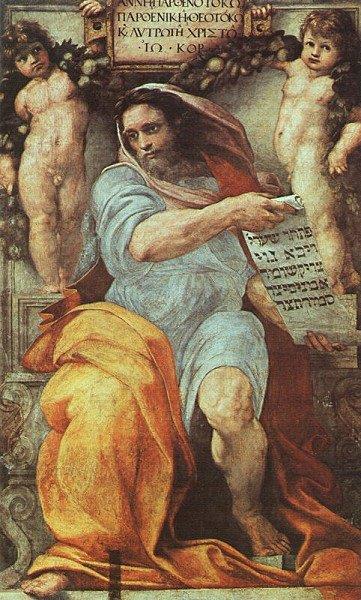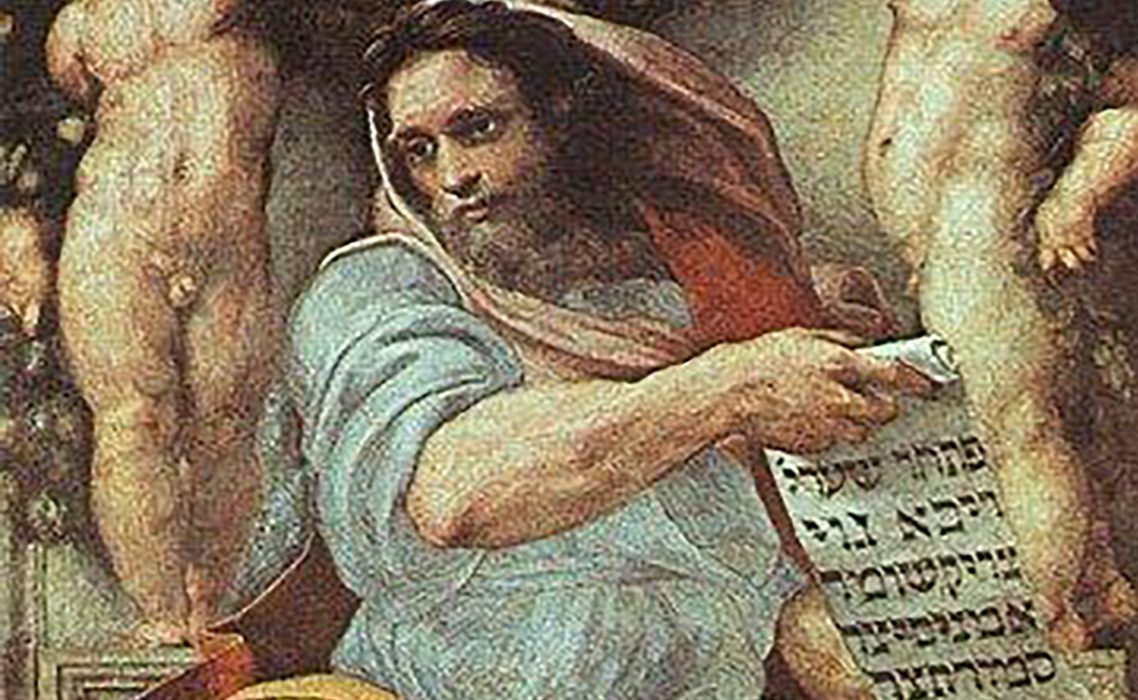November 28, 2017 // Bishop's Column: In Truth and Charity
The God-who-comes
The Advent season is about to begin and, with it, the beginning of a new liturgical year. The Latin word “Advent” is a translation of the Greek word “Parousia,” which means coming or arrival. So what is Advent? It is a special time to reflect on, celebrate and prepare for the coming of the Lord.
In the first reading on this First Sunday of Advent, we hear Isaiah’s prayerful cry to God: “Oh, that you would rend the heavens and come down!” This is a cry of the human heart longing for peace and justice, freedom and happiness, joy and life. Human fulfillment is not something we can attain by ourselves. We cannot save ourselves. We need to be rescued from sin, healed from misery and suffering, and saved from death. God hears our cry, the cry of Isaiah. He rends the heavens and comes down. In fact, this is His nature — He is the God-who-comes.

Raphael’s painting of the prophet Isaiah hangs in Sant’Agostino church in Rome. Isaiah has been called the great Prophet of Advent: More than any other Old Testament prophet, Isaiah announced the coming of the Messiah and issues the call to prepare for His coming. Readings from the book of the prophet of Isaiah are read at liturgies throughout the Advent season. In this Sunday’s reading, we hear Isaiah’s prayer to God: “Oh, that you would rend the heavens and come down!”
God is not up there in heaven, unconcerned with us and our lives and our history. He is the God-who-comes. As Pope Benedict XVI once said: “He is a Father who never stops thinking of us and, in the extreme respect of our freedom, desires to meet us and visit us; He wants to come, to dwell among us, to stay with us. His coming is motivated by the desire to free us from evil and death, from all that prevents our true happiness. God comes to save us.”
The coming of God is centered in the two great comings of Christ that we remember during Advent. The first is His Incarnation. In this coming, in what Scripture calls “the fullness of time,” Christ comes as our Redeemer. This first coming of Jesus is the focus of the last two weeks of Advent. It is what we celebrate at Christmas. During Advent, we prepare to welcome anew the Word made flesh for our salvation. How important it is that we celebrate Christmas with Christ at the center, keeping in mind that Christmas is the Feast of the Nativity of the Lord, the joyful mystery of the coming of the Son of God as man in the stable at Bethlehem.
The first two weeks of Advent focus on the other great coming of Christ at the end of the world. The Church’s liturgy focuses on Our Lord’s glorious return at the end of time. He will come to judge the living and the dead. Advent thus includes a special call for us to be vigilant and watchful, ready for the second coming of the Lord. In this Sunday’s Gospel, we hear these words of Jesus to His disciples, words also addressed to us: “Be watchful! Be alert!… You do not know when the lord of the house is coming… May he not come suddenly and find you sleeping. What I say to you, I say to all: ‘Watch!’”
Yes, the God of Jesus Christ, the God we believe in, is the God-who-comes. His coming is an ever-continuous action. Pope Benedict said that God’s coming is “a continuous present… it happened, it is happening now, and it will happen again.” This is what Advent teaches us. We should remember that God comes, not just in the past and in the future, but today, now! St. Bernard of Clairvaux wrote about what he called Christ’s “intermediate” and “hidden” coming, a bridge between His first and second coming. This is the coming of the Lord into the souls of believers.
God who came to earth in the Incarnation and who will come at the end of time comes to us now. He is near to us always. He comes to us in His living Word. He comes to us with His grace in all the sacraments. He comes to us, as we heard in last Sunday’s Gospel of the final judgment, in the least of our brothers and sisters, in the poor, the sick, the suffering, the stranger and the outcast. And He comes to us in the most amazing way in the greatest of all the sacraments, the Most Holy Eucharist. He dwells among us in the Eucharist, the Sacrament of Christ’s Body and Blood. During Advent, it is good to make visits to the Blessed Sacrament. May we never take for granted the coming of the Lord on the altars of our churches and His presence in our tabernacles!
Advent is a special time of prayer, though it can be difficult in our culture in which this is such a busy and commercialized season. Yet, the Church asks us to observe Advent and not to prematurely celebrate Christmas. This takes effort, but it is not impossible. Prayer makes it possible, especially by entering into the spirit of Advent through the prayers and readings of the Advent liturgies.
Another way to keep the Advent season is through good works. In the prayer of the First Sunday of Advent, the Church asks God to give us the resolve “to run forth to meet your Christ with righteous deeds at His coming.” Advent is particularly suited to this since we are often busy with buying gifts for our loved ones for Christmas. But let’s remember the poor in our Christmas shopping and gift-giving! Every little bit of good we do for the poor and needy, every act of kindness, every work of mercy is great in God’s eyes. May we open our hearts to others during the Advent season, especially those who are in difficulty. By doing good to those in need, we prepare to welcome Jesus who comes, in them, to visit us.
Finally, Advent is a good time to go to confession. As St. Paul wrote, “It is full time now for you to wake from sleep” (Romans 13:11). In confession, we throw off the lethargy of sin. The Lord-who-comes gives us the grace of His forgiveness. We don’t want the Lord to come suddenly and find us sleeping. We are watchful and alert when we refuse to remain in a state of sin, when we run to meet the Lord in the Sacrament of Reconciliation.
The Blessed Virgin Mary is the icon of Advent. She shows us what it means to welcome the Lord into our hearts and to say “yes” to the God-who-comes. Holy Mary, Mother of our Savior, help us to follow your example!
The best news. Delivered to your inbox.
Subscribe to our mailing list today.






